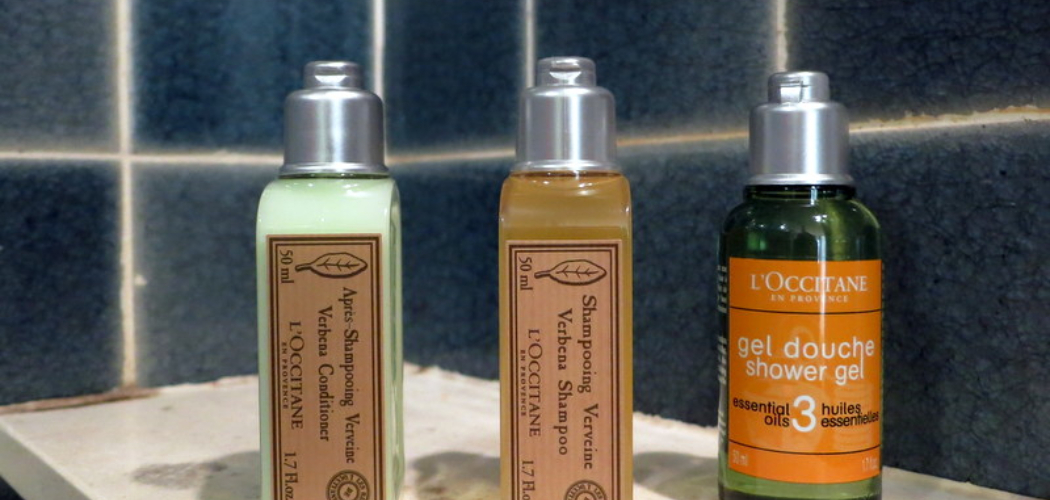Using essential oils in the shower offers a simple yet profoundly effective way to incorporate the benefits of aromatherapy into your daily routine. The practice involves dispersing your chosen essential oils within the shower enclosure, transforming an ordinary shower into a rejuvenating or relaxing spa experience. This guide aims to instruct on how to use essential oils in shower efficiently, ensuring you harness the full therapeutic potential of these potent natural extracts.
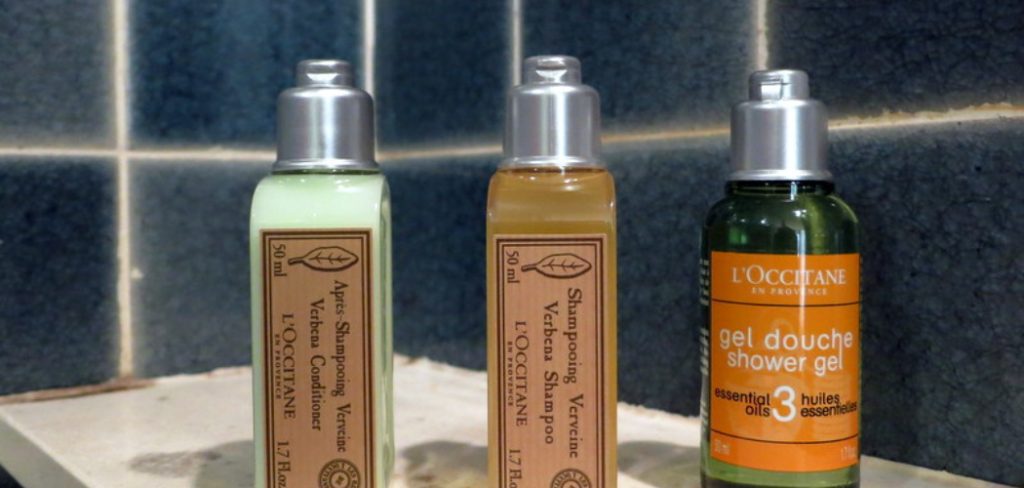
Aromatherapy in the shower can significantly enhance your well-being by promoting relaxation, invigorating the senses, or even improving clarity and focus. The steam from the shower helps to release the essential oil’s aroma, enveloping you in a fragrant cloud that can soothe stress, ease respiratory issues, and rejuvenate the spirit.
Essential oils are concentrated plant extracts obtained through distillation or mechanical pressing. Each oil boasts a unique chemical composition that dictates its aroma, color, and therapeutic attributes. From the uplifting scent of citrus oils to the calming essence of lavender, essential oils offer a wide range of health and wellness benefits that can be tailor-made to suit your needs and preferences.
Choosing Essential Oils
Selecting the right essential oils for your shower can transform your daily routine into a personalized aromatherapy session. The key is choosing oils based on the desired effects, be it relaxation, refreshment, or something else entirely.
For instance, lavender and chamomile are renowned for their calming properties, making them ideal for an evening shower to unwind before bed. Conversely, citrus oils like lemon or grapefruit can invigorate the senses, perfect for a morning shower that energizes you for the day ahead.
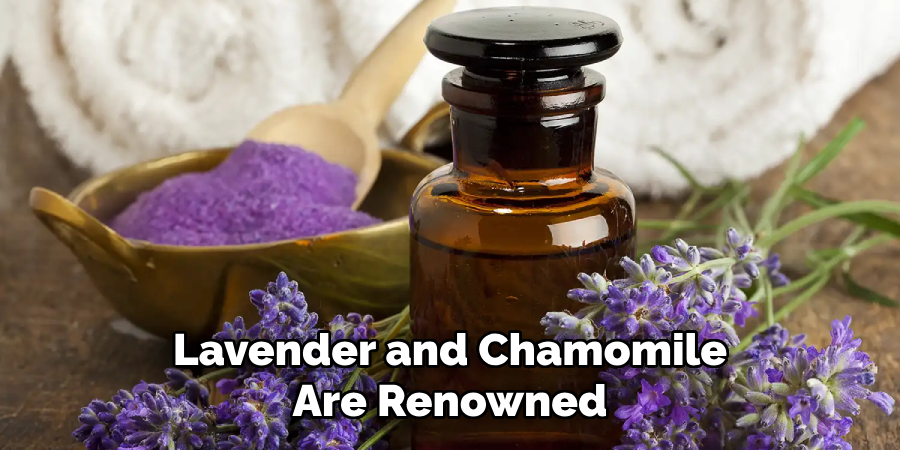
A. Selecting Essential Oils Based on Desired Effects
Consider what you want to achieve with your shower aromatherapy experience. If you’re looking to de-stress, look for oils with relaxing properties. If you need a morning boost, choose oils that stimulate and invigorate.
B. Considering Personal Preferences and Sensitivities
An essential aspect of selecting essential oils is your personal preference for aroma and any sensitivities you might have. Choosing oils you enjoy that do not cause any adverse reactions is important. Conducting a patch test or consulting a healthcare provider can prevent potential issues.
C. Exploring Popular Essential Oil Options for Shower Use
Several essential oils stand out for their popularity and efficacy in the shower. With its refreshing and clearing aroma, Eucalyptus is excellent for respiratory health. Peppermint oil can invigorate the senses and offer relief from fatigue.
For those seeking relaxation, lavender oil provides a soothing scent that reduces stress and enhances sleep quality. Each oil offers unique benefits, allowing for a highly personalized aromatherapy experience in the comfort of your shower.
Preparing for Shower Aromatherapy
Before indulging in the aromatic bliss of shower aromatherapy, preparing adequately is essential to ensure a safe and enjoyable experience. The following steps will guide you in setting up your shower space for aromatherapy.
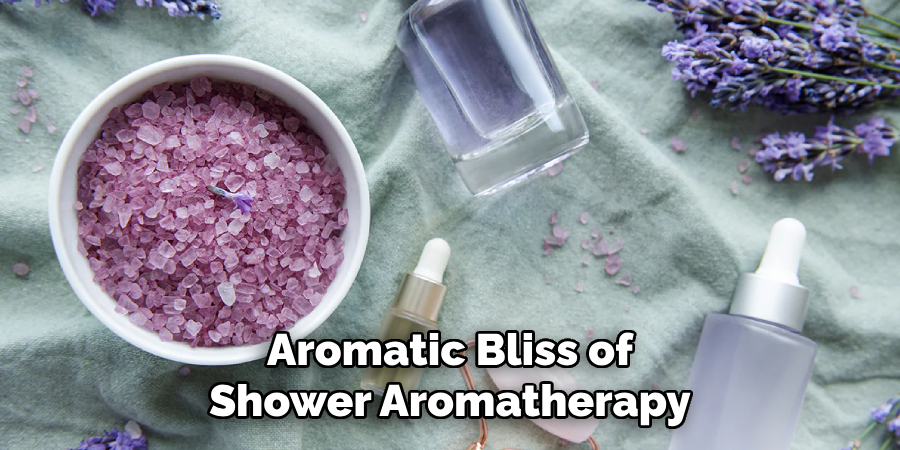
A. Gathering Necessary Supplies
The first and most important step is to gather all the necessary supplies. You’ll primarily need your selected essential oils and a carrier oil like coconut or jojoba oil if you prefer to dilute them. If you’re using a diffuser, ensure it’s clean and functioning well. Alternatively, consider other methods for dispersing the essential oils, such as placing a few drops on a washcloth or using an aromatherapy disc designated for shower use.
B. Ensuring Proper Ventilation in the Bathroom
Proper ventilation is crucial when using essential oils in the shower. It prevents the build-up of strong scents that could potentially be overwhelming or irritating. Before showering, ensure the bathroom fan is on or a window is open. This will help circulate air and distribute the essential oil aroma evenly for a more pleasant experience.
C. Setting the Mood for Relaxation or Revitalization
The mood of your aromatherapy session can significantly influence its effectiveness. For a relaxing evening shower, you might dim the lights, play soft music, and choose essential oils known for their calming properties, such as lavender or chamomile.
For an energizing morning shower, bright lighting paired with upbeat music and invigorating scents like peppermint or citrus can kickstart your day. This preparatory step is key to tailoring the aromatherapy experience to your current needs, whether it’s de-stressing after a long day or energizing in anticipation of one.
How to Use Essential Oils in Shower: Applying Essential Oils in the Shower
The application of essential oils in the shower can be accomplished through both direct and indirect methods, each offering a unique way to experience the benefits of aromatherapy. Understanding these application techniques ensures that you can enjoy a safe, enjoyable, and beneficial aromatherapy shower experience.
A. Direct Application Method
The direct application method involves applying essential oils directly to surfaces within the shower environment, allowing the steam and warmth of the shower to disperse the aromas.
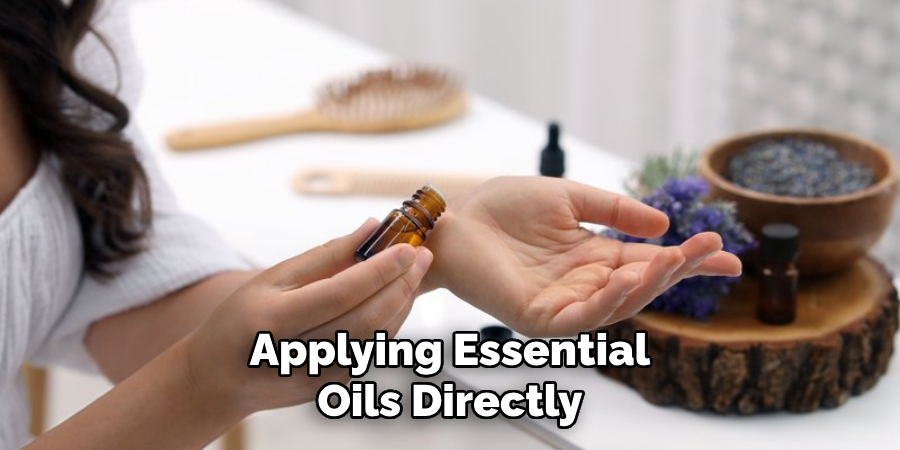
- Dropping Essential Oils onto the Shower Floor
Adding a few drops of essential oil directly onto the shower floor, specifically in a corner far from the direct stream of water, can effectively disperse the scent through the steam generated. This method is particularly effective with oils known for their respiratory benefits, such as eucalyptus or peppermint, creating an invigorating shower experience.
- Applying Essential Oils to Shower Walls or Tiles
Another direct application technique involves placing a few drops of oil on the shower walls or tiles. It’s recommended to apply the oil at chest or head height on walls that will be exposed to indirect water. This method allows the essential oils to slowly release their fragrant aroma, enveloping you in a fragrant atmosphere that enhances your shower experience.
B. Indirect Application Method
The indirect application method allows for the introduction of essential oils into your shower experience without direct contact with your skin or the shower surfaces.
- Using a Diffuser or Aromatherapy Disc
Placing a water-resistant diffuser or an aromatherapy disc in your bathroom can offer a continuous aroma without the need for frequent reapplication. Some diffusers are designed to adhere to shower walls, gently releasing the oil’s essence as they become warm from the steam.
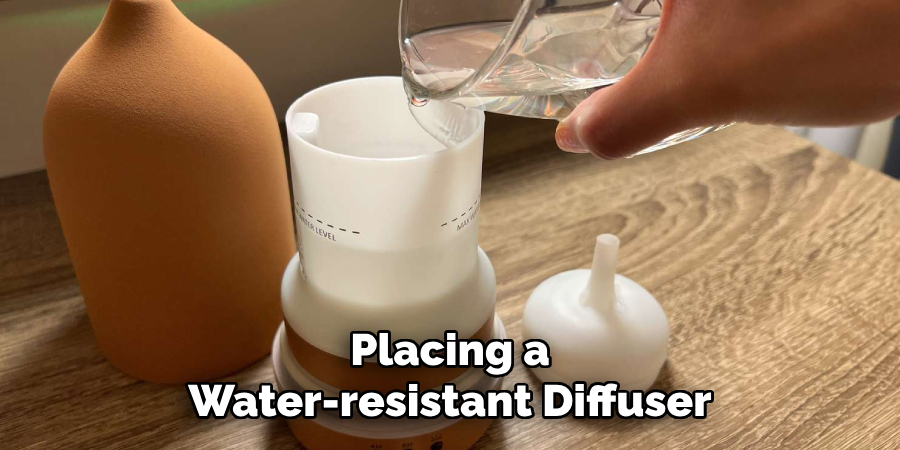
- Adding Essential Oils to a Washcloth or Sponge
For a more controlled aromatherapy experience, add a few drops of your chosen essential oil to a washcloth or sponge. Placing it on the shower floor away from the direct water stream or hanging it near the showerhead can allow the steam to activate the oils, subtly infusing your shower with therapeutic aromas. This method also provides the added benefit of letting you control the oil’s dispersion by squeezing the cloth or sponge, releasing more aroma as needed.
By exploring these methods, users can tailor their shower aromatherapy experience to their preferences, creating a custom spa-like environment in the comfort of their own bathroom.
How to Use Essential Oils in Shower: Adjusting Oil Concentration and Intensity
Adjusting the concentration and intensity of essential oils is key to achieving the desired effects of your aromatherapy shower experience. Differences in personal sensitivity and the specific outcomes you’re aiming for require customization of oil dilutions and amounts. Here’s how to refine your approach to find the perfect balance for your needs.
A. Experimenting with Different Oil Dilutions
Essential oils are potent and, when used undiluted, can sometimes be too intense or even cause skin irritation. To avoid this, begin by experimenting with dilutions, especially if you plan to use the oil in a way that might come into contact with your skin.
A common starting point is to dilute a few drops of essential oil in a carrier oil like coconut or jojoba. You can also adjust the intensity of the aroma by altering the ratio of essential oil to carrier oil. Start with a higher ratio of carrier oil to essential oil, and gradually adjust until you find a mixture that offers the aroma strength you desire without overwhelming your senses or irritating your skin.

B. Adapting Oil Amounts Based on Personal Preference and Sensitivity
Each individual’s sensitivity to essential oils can vary greatly. While some may find certain scents too subtle, others may perceive them as overpowering. Begin with a conservative amount of essential oil, perhaps two to three drops, and incrementally increase it based on your personal preference and how your body reacts.
Pay attention to your body’s responses to different scents and concentrations, particularly if you’re prone to allergies or respiratory issues. Some oils might be too strong at standard concentrations and require further dilution.
C. Finding the Ideal Balance for Desired Aromatherapy Effects
The ultimate goal of adjusting oil concentration and intensity in your shower aromatherapy is to find that sweet spot where the essential oils provide the desired therapeutic effects without any adverse reactions. This balance is highly personal and may change based on your day-to-day mood, health, and the specific benefits you seek from aromatherapy.
For instance, a higher concentration of lavender might be preferred for its calming effects at night, while a milder peppermint aroma could be more suitable for an invigorating morning shower. Keep a log of different oils’ dilutions, amounts, and effects to refine your approach and consistently achieve the desired outcomes. With patience and experimentation, you can craft an aromatherapy shower ritual that perfectly suits your needs and enhances your well-being.
Incorporating Essential Oils into Shower Routines
Integrating essential oils into your daily shower routines can significantly enhance your overall well-being, setting the tone for a relaxed or energized day ahead. Here’s how to tailor your shower rituals to different times of the day for maximum benefits.
A. Morning Shower Rituals:
A morning shower can drastically influence your mood and productivity for the day. Utilizing specific essential oils can help awaken your senses and prepare you for the challenges ahead.

- Energizing Citrus Scents
Kickstart your day with the uplifting aromas of citrus essential oils such as orange, lemon, or grapefruit. These scents boost mood and energy levels, helping to clear the mind and stimulate mental alertness. Add a few drops of your chosen citrus oil to the shower floor or a washcloth to invigorate your morning routine.
- Invigorating Minty Blends
Consider adding peppermint or spearmint essential oil to your shower for an extra burst of freshness. These oils are celebrated for increasing energy and improving focus. Their cooling effect also helps to revive the skin, leaving you feeling refreshed and ready to tackle your day.
B. Evening Shower Rituals:
Evening showers can be an integral part of your wind-down routine, assisting in the transition from the day’s stresses to a state of relaxation and preparedness for rest.
- Calming Lavender or Chamomile Scents
Incorporate lavender or chamomile essential oils into your evening shower to promote relaxation and improve sleep quality. These oils are renowned for their calming and soothing properties, helping to alleviate stress and prepare your body and mind for a restful night.
- Soothing Eucalyptus or Tea Tree Blends

Eucalyptus and tea tree oils, with their cooling and refreshing properties, can provide a soothing experience. They are also beneficial for clearing the mind and promoting respiratory health, making them perfect for an evening shower ritual that cleanses the body and calms the spirit.
By thoughtfully selecting essential oils that align with your energy needs and incorporating them into your morning and evening shower rituals, you can create a daily regimen that supports both your mental and physical well-being.
Maximizing Aromatherapy Benefits
Consider integrating the following practices into your routine to further enrich your aromatherapy shower experience and maximize the benefits of the essential oils.
A. Practicing Mindfulness and Deep Breathing Techniques
Mindfulness and deep breathing are powerful techniques that can amplify the therapeutic effects of essential oils. By focusing on your breath and being present in the moment, you help your body and mind fully absorb the benefits of the aromas. Take slow, deep breaths during your shower to facilitate relaxation and stress relief. This practice enhances the calming or invigorating properties of the oils and improves overall respiratory health.
B. Pairing Essential Oil Use with Other Relaxation Practices (e.g., Meditation, Stretching)
Combining essential oils with other relaxation practices like meditation and stretching can create a comprehensive wellness ritual. After your shower, extend your self-care routine by engaging in a few minutes of meditation or gentle stretching. These activities, complemented by the lingering scent of your chosen essential oils, can help reduce anxiety, improve flexibility, and elevate mood.
C. Taking Advantage of the Steam to Enhance Aromatherapy Effects
The steam in your shower is a natural diffuser for essential oils, allowing the aromas to disperse more effectively and be inhaled deeply. To make the most of this, add drops of your essential oils to the corners of the shower or on a wet washcloth hung near the water stream. The heat and steam will help release the full spectrum of scents and therapeutic properties, enveloping you in a fragrant, healing atmosphere that maximizes aromatherapy benefits.
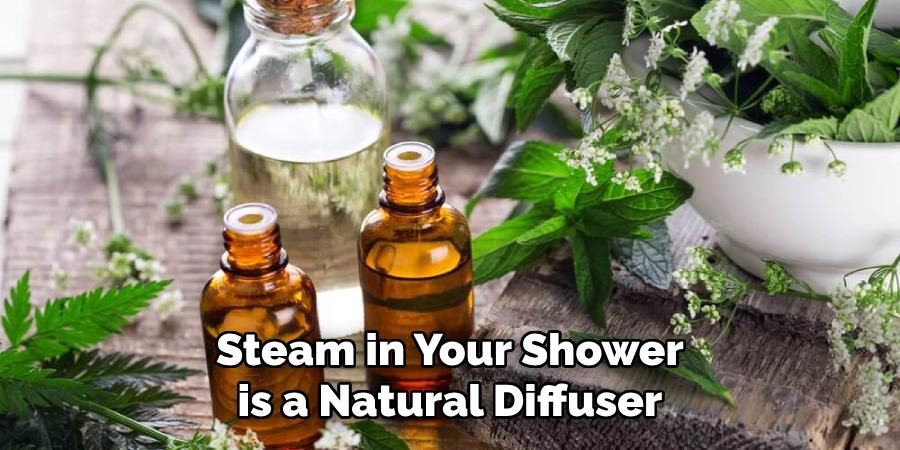
Post-Shower Care and Clean-Up
After enjoying a rejuvenating aromatherapy shower, cleaning up and storing your supplies properly can help maintain a pleasant and safe environment for your next session.
A. Rinsing Shower Surfaces to Remove Oil Residue
Essential oils can leave a slippery residue on shower floors and walls, which may become a safety hazard if not addressed. To prevent slips and falls, it’s crucial to rinse shower surfaces thoroughly after each use. Hot water can effectively remove oil traces, ensuring a clean and safe shower environment for you and your family.
B. Wiping Down Diffuser or Aromatherapy Disc
Regular cleaning is essential to maintain its efficiency and lifespan if you use a shower diffuser or an aromatherapy disc to disperse essential oils. After each use, wipe the device with a damp cloth to remove any oil residue. Follow the manufacturer’s instructions for a deeper clean, which may involve using specific cleaning solutions or disassembling the device for occasional maintenance.
C. Storing Essential Oils Properly to Preserve Their Quality
Proper storage of essential oils is critical to preserving their therapeutic properties and extending their shelf life. Essential oils should be kept in a cool, dark place out of direct sunlight.
For this reason, many oils come in amber or blue bottles, but if you transfer them to different containers, ensure they are appropriately colored and sealed. Avoid storing oils in plastic containers as the oils can degrade the plastic, leading to contamination. Lastly, ensure the caps are tightly closed to prevent oxidation, which can diminish the oils’ effectiveness over time.
By following these simple post-shower care and clean-up steps, you can ensure that your shower area remains clean, safe, and ready for your next aromatherapy session while keeping your essential oils at their best quality for as long as possible.
Safety Considerations
Incorporating essential oils into your shower routine can provide both physical and mental benefits. However, using these potent natural extracts safely is crucial to avoid adverse reactions. Below are some key safety considerations to keep in mind.
A. Checking for Allergies or Sensitivities Before Use
Before adding any new essential oil to your shower routine, conduct a patch test to check for allergic reactions or skin sensitivities. Apply a diluted drop of the oil to a small area of your forearm and wait for at least 24 hours. If you experience any redness, swelling, itching, or discomfort, it’s best to avoid using that particular oil.
B. Avoiding Direct Contact with Eyes or Mucous Membranes
Essential oils are highly concentrated and can cause irritation or burning sensations if they come into direct contact with the eyes or mucous membranes. Always dilute essential oils before use, and be cautious not to touch your face during or immediately after using the oils in the shower. If accidental contact occurs, rinse the affected area thoroughly with cool water.
C. Using Caution with Certain Essential Oils During Pregnancy or with Medical Conditions
Certain essential oils are not recommended for use during pregnancy or by those with specific medical conditions. For example, oils such as rosemary, clary sage, and jasmine should be avoided during pregnancy.
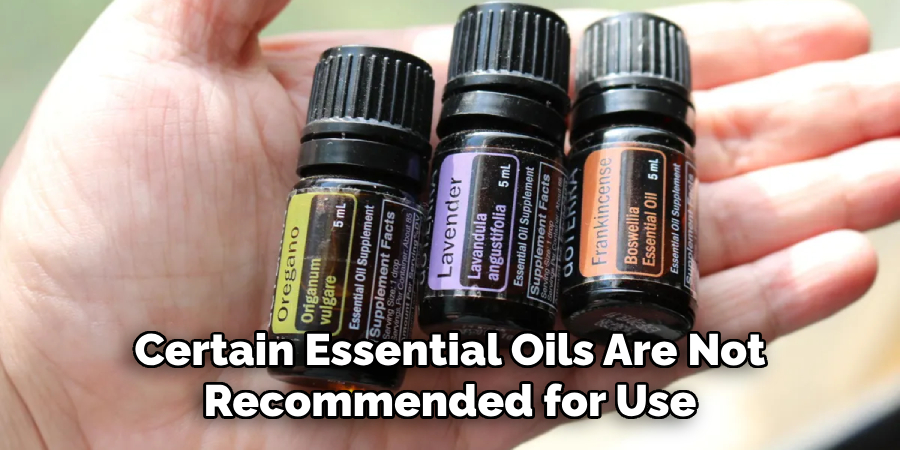
Additionally, individuals with epilepsy or high blood pressure should exercise caution and consult with a healthcare professional before using specific oils like rosemary or eucalyptus. Always research and consult a healthcare provider if you have any concerns about incorporating essential oils into your wellness routine.
By adhering to these safety considerations, you can enjoy essential oils’ aromatic and therapeutic benefits in your showers without compromising your health or well-being.
Conclusion
Throughout this guide, we’ve explored the myriad ways in which essential oils can be incorporated into your shower routine to harness their therapeutic benefits. From adding oils directly to the water to using diffusers and aromatherapy discs, we’ve covered a range of methods to transform your daily shower into a spa-like aromatherapy experience.
Shower aromatherapy offers a wealth of benefits for both the mind and body, providing a unique way to de-stress, rejuvenate, and heal. The inhalation of essential oil vapors can calm the mind, reduce anxiety and stress, and enhance mood. Physically, these potent botanical extracts can help relieve pain, improve respiratory health, and invigorate the senses, making each shower a holistic wellness practice.
To maximize the benefits of your aromatherapy shower, it’s essential to know how to use essential oils in shower settings effectively. Always begin by choosing high-quality, pure essential oils and diluting them appropriately to avoid skin irritation.
Consider timing your aromatherapy sessions; morning showers can be energized with uplifting scents like citrus or peppermint, while evening showers may benefit from calming lavender or chamomile. Lastly, don’t forget the power of combining oils for a tailored aroma that meets your specific needs. Experiment with blends and concentrations to find your perfect shower aromatherapy balance.
By following these guidelines and incorporating essential oils into your shower routine thoughtfully, you can significantly enhance your physical and mental well-being, turning every shower into a luxurious, healing, and rejuvenating experience.

